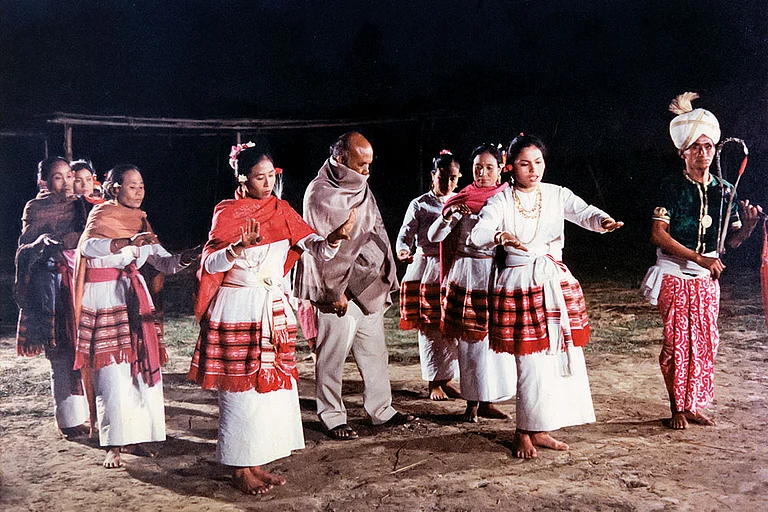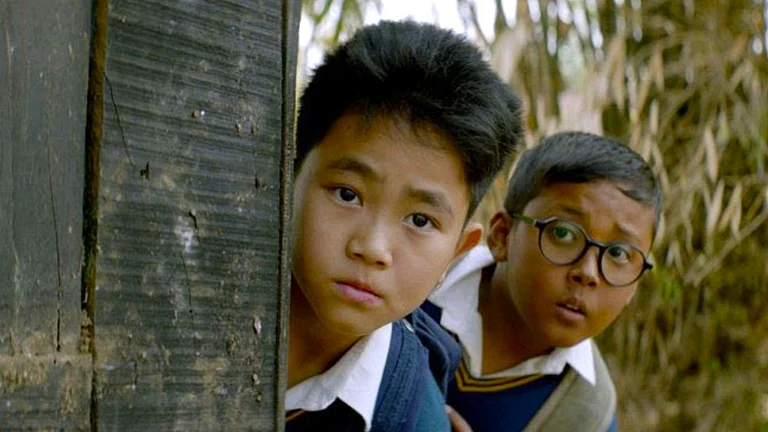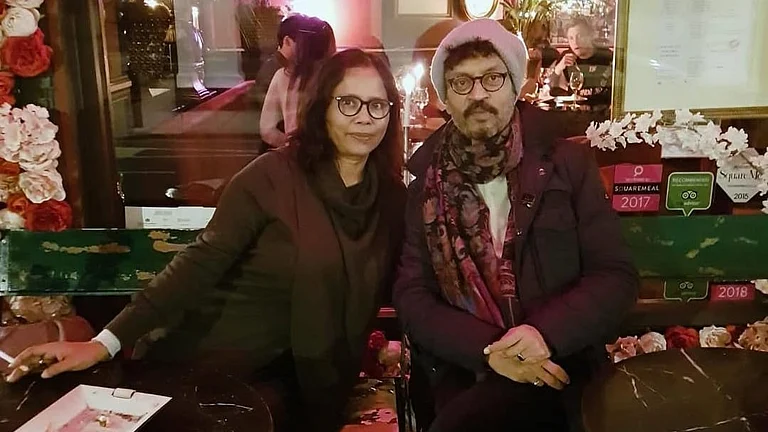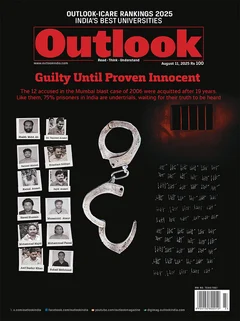If you could start with your assessment of the situation of Manipuri theatre at the current time.
The pace of the development of Manipuri theatre has really been hampered over the last 10 years or so because of the political situation here and the economic crisis that come with it. This has happened because, I think, theatre cannot only be a kind of ‘art for art’s sake’ programme, but is always linked with the socio-political situation, which is reflected in the performance, and also in the growth of theatre as a whole. That’s why I’ve been very disheartened. In the 70s we saw that we could really give a lot to theatre, many experiments were carried out here—all of this has been affected. The economic crisis is really important, as Manipur does have a lot of young talent, both in terms of actors and directors, who are good and keen, but are unable to carry on simply due to lack of funds. As a theatre actor or director, of course one can’t expect a lot of money and fame, but surely one must earn one’s bread and butter!
The other aspect where we have failed is that there’s a lack of exposure to different kinds of theatre and theatre people. Manipur has not seen the theatre happening in other parts of India or in foreign countries—this theatre has never been to Manipur, and we do not have the money to travel to see them. That’s why, even with a lot of talent and potential, the communication problem has become a very important drawback in contemporary Manipuri theatre.
The same problem can also be seen with the designs created, as no theatre group can spend much on set design, lighting or any other such aspect of theatre. Now, things are computerized everywhere, they’re very high-tech, and we cannot do that in Manipuri theatre.
In the case of playwrights also, we have no interaction. A playwright here should interact with other playwrights of other languages, which doesn’t happen. You know, I feel that not only production, but theatre as a whole suffers if our actors, our directors, our set designers, or our playwrights, cannot go outside because of the economic problems here. What I’m trying to do is to bring them over, but for that also we need money.
We work daily and we try to survive with whatever we get out of our performances. But we’re very insecure, as we don’t really know how much money we’ll be getting in a year; the maintenance, the production cost, everything is becoming very high. That’s why I think that Manipuri theatre is facing a lot of problems. It was not like this till the 70s and 80s. But after the 80s, this is a very serious problem we’re facing. The theatre workers here are very active, they really do something or the other, just to satisfy themselves, do experimental work and so on. I think it’s a very good sign.
Apart from this problem with communication and exposure, I think Manipuri theatre is like Polish theatre. During the period in Poland when everything was under curfew, there was political turmoil and Walesa was coming up. During that period, Polish theatre was very active, nothing could stop them. That is what I appreciate about Manipuri theatre also. Nothing has stopped theatre activity here, whatever the crisis. And you know, the government here, the art and culture department, the State Kala Akademi—they’ve nothing to do with the development of theatre. But in spite of all these things, I think that professionalism in Manipuri theatre is growing very fast. By professionalism I don’t mean commercialization, but a really professional approach to theatre. See, people are always talking about having no money for theatre despite working very hard, and so on. I’m not talking about that. Of course, money is always required, but I’d rather tell you that the kind of theatre competitions or theatre festivals that we carry out here in Manipur, which have proved to be very healthy. Earlier, it was not like that. But after the 80s it’s really become competitive, everybody is trying very hard, all the directors especially, and we can see quite a lot of interesting work. These productions, all done without high production costs, can go to any national festival. You can say that some of them may not be up to the mark, but on an average, the work is very interesting.
“The development of Manipuri theatre has really been hampered over the last 10 years or so because of the political situation.”
You say that isolation, lack of communication, a kind of atmosphere of alienation is very predominant in Manipur and that this kind of situation has become a very important factor. My question is, why theatre and why not the other arts? What is so special about theatre, in the local context?
If we consider theatre as a composite art at all, then Manipur is a place where elements of theatre are more available than in many other states, because here you will see a lot of traditional art forms, narrative forms, which can be utilized in theatre as a source of inspiration, as direct elements and non-direct elements. Theatre is surviving here only because of that. All these elements of composite art are available here. At the same time, you’ll see that in most of the plays, maybe it is taken out of the Mahabharata, or a short story or whatever, but in all these productions the thematic content is a kind of attack against the system. This kind of thematic content is very much in existence, and that’s why the expression becomes very important. The expression in theatre—we have a lot of writers here, a lot of poets, very interesting, good poets, short story writers, novelists, also painters—but the theatre people here are trying much harder than the rest of the people to express themselves.
MORE FROM THIS ISSUE
Could you tell us why you got interested in this sphere of the language of expression?
Because I felt that, whether in English or Hindi or Manipuri—any language, basically—the actor is not going to utter the same lines or the same dialogues that are in the written script. He is meant to express it in such a way that the meaning or the aesthetic aspect, the shape and the size, the weight and the balance of the words—all these come out. His postures and gestures, the penetration of the space—all these things come out in his words, because words constitute the basic background of an actor. It may not necessarily be always, but most of the time the playwright is writing with a certain significance attached to the words he uses. It is very sad also on the actor’s part when he cannot deliver or express it properly. So there should be a language to specify how to express it. Say the playwright has written something which is very authentic, but the actor is getting it only in print; he may never have gone through the experiences that the writer has. I’m not saying that he needs to have that kind of experience, I’m only saying that the actor needs to know how serious the words are—that’s the first thing. Then the actor can try to get a kind of language, not just the words of that language, but a language where the actor, with his physical force, his external and internal energy, tries to bring out, to tell, to express something which is not merely ‘said’.
Even in realistic plays, if the language of expression is wrong, then the whole interpretation goes wrong. Even the building up of characters—whatever line it follows—Stanislavsky or Brecht or Grotowski—is dependent on the language of expression. It is the actor’s own language of expression which is going to be significant, all the way to the end of the performance. He tries to think, he tries to deliver, and this delivery is not very easy, he has to study a lot. Not only the script, but the aesthetics of performance, the degree of preference—because the actor’s language of expression is the only tool for communication. The audience is sitting there and I’m performing here, but the audience is not taking that in, they’re thinking something else—that happens because of the lack of the language of expression. I know this because there are many actors who work very sincerely, systematically when I tell them to work. They work, do a lot of physical exercises and movements and so on, but even after that we find that they have no language of expression. They cannot express themselves. So when you see that this actor cannot deliver, one must ask, why can’t he? Because he doesn’t know what the language of his expression should be. I think this is a very essential point, knowing how to express. Because without knowing that, one can’t grow as an actor.
Courtesy: The Seagull Theatre Quarterly, Issues 14–15 (Edited by Ajum Katyal) (June–September 1997)
































